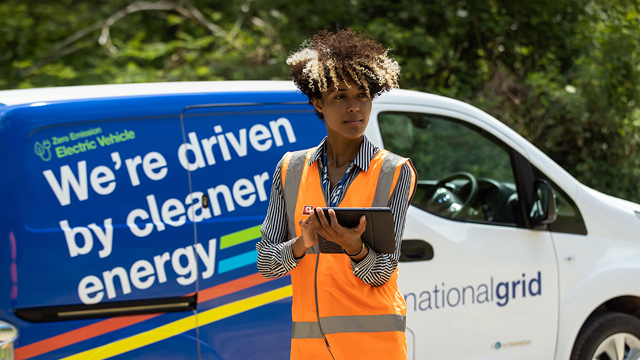
[1 October] National Grid to cut Scope 3 GHG emissions by 20% by 2030
National Grid today announces commitments to reduce Scope3 greenhouse gas emissions (GHG) emissions for the electricity and gas we sell to our customers by 20% by 2030. The target aligns to Science Based Targets Initiative’s two degrees pathway. National Grid will also reduce Scope 1 and 2 GHG by 80% by 2030, 90% by 2040, and to net zero by 2050 from a 1990 baseline.
The move is part of a set of commitments announced by National Grid today in a Responsible Business Charter, which identifies where we can have the most impact on society. The Charter comprises of five focus areas: environment, the communities we serve, our people, the economy, and our governance.
For each, National Grid has set out commitments, specific targets and outlines how they will be achieved.
The commitments include:
- Eliminate all SF6 gas from our assets by 2050
- Reduce annual air miles by at least 50% from a 2019 baseline and offset any remaining emissions so that we reach zero emissions
- Move to a 100% electric fleet by 2030 for our light-duty vehicles, and replace our medium- and heavy-duty vehicles with zero carbon alternatives
- Continue to reinvest in energy infrastructure at approximately £5 billion each year
- Develop skills for the future, with a focus on lower income communities, providing access to skills development for 45,000 people by 2030
- Achieve 500,000 employee volunteering hours by 2030
- Achieve 50% diversity in our Group Executive Committee, Senior Leadership group and all new talent programmes by 2025
John Pettigrew, CEO at National Grid, says: "Society’s expectations of business and the role business plays in the world are changing. We share the belief that business needs to stand for something more than profitability. Now, more than ever, we have a responsibility to demonstrate our contribution to society more broadly – whether that’s by giving young people today the opportunities to become the problem solvers of tomorrow, or in tackling climate change by reducing our own emissions and helping our customers use energy more efficiently.”
He also says: “We must make significant changes to curb harmful emissions. Since 1990, we’ve reduced our direct (Scope 1 and 2) emissions by 70% (as at March 2020). That’s well in excess of our interim target, which was 45% by 2020. But there is much more we can do and that’s why we’re setting ourselves more ambitious targets.”
Alongside the commitments, National Grid is joining the B-Team, a movement of global business leaders driving better ways of doing business for the wellbeing of people and the planet. The B Team principles of sustainability, equality and accountability will transform National Grid’s own practices to create inclusive social, environmental and economic benefit.
National Grid will report on progress annually in a new Responsible Business Report from 2021.
Notes to editors
By diversity in the workforce, we mean gender (Men at a balanced ratio with Women, Non-Binary, Gender Fluid, Gender Neutral, Transgender, or Other), and ethnicity (meaning white/Caucasian:non-white/Caucasian), with equality for all employees in the way they are hired, promoted, developed, paid, and retained at the same rate.
Press contact:
T: 07812 485153


